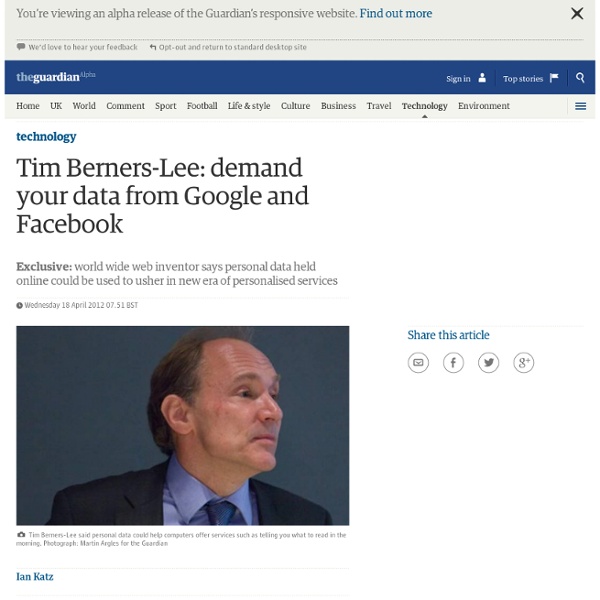What is smart disclosure?
Citizens generate an enormous amount of economically valuable data through interactions with companies and government. Earlier this year, a report from the World Economic Forum and McKinsey Consulting described the emergence of personal data as of a new asset class.” The value created from such data does not, however, always go to the benefit of consumers, particularly when third parties collect it, separating people from their personal data. The emergence of new technologies and government policies has provided an opportunity to both empower consumers and create new markets from “smarter disclosure” of this personal data. Smart disclosure is part of the final United States National Action Plan for its participation in the Open Government Partnership.” “We’ve developed new tools — called ‘smart disclosures’ — so that the data we make public can help people make health care choices, help small businesses innovate, and help scientists achieve new breakthroughs,” said President Obama.
“Big Data” « Search Results
Informing Consumers through Smart Disclosure
Posted by Cass Sunstein on March 30, 2012 at 08:19 AM EDT Today, the White House and the National Archives and Records Administration (NARA), with support from ideas42, will host a summit on Smart Disclosure – a new tool that helps provide consumers with greater access to the information they need to make informed choices. In many contexts, the Federal government uses disclosure as a way to ensure that consumers know what they are purchasing and are able to compare alternatives. In September 2011, the Office of Management and Budget issued guidance to Federal agencies on Smart Disclosure. The Administration has also committed to promoting the use of Smart Disclosure in its Open Government Partnership National Action Plan, and in announcing the National Action Plan, the President specifically referred to Smart Disclosure. The White House, NARA, and ideas42 summit will help advance that work. Cass Sunstein is the Administrator of the Office of Information and Regulatory Affairs
Big Data, grande illusion
La cause serait entendue : après le cloud computing et l’internet des objets, les « big data » constitueraient la prochaine « révolution » apportée par le numérique. Alan Mitchell, cofondateur et directeur de la stratégie du cabinet britannique Ctrl-Shift, n’est pas d’accord. Pour lui, les Big Data auraient presque un côté contre-révolutionnaire : le chant du cygne d’une informatique productiviste, centralisatrice, centrée sur les grandes organisations. « Les Big Data se fondent entièrement sur la statistique : dégager des schémas et des tendances à partir de grandes collections de données. La statistique fournit une manière extraordinairement puissante et utile de remettre en questions les suppositions et les inférences que les cerveaux humains produisent naturellement – et souvent de manière erronée. C’est formidable. « Mais le principal déficit que rencontre notre société ne réside pas dans la capacité de traiter un grand nombre de données, bien au contraire. Et pourquoi pas ?
Digital ID Coach
Quand vous ne voyez pas le service, c’est que vous êtes le produit !
La lecture de la semaine, il s’agit d’un article de l’hebdomadaire américain The Nation, il est signé par Ari Melber, journaliste et spécialiste des réseaux sociaux, il s’intitule “Le secret de la valorisation de Facebook”. L’occasion de revenir sur un événement largement commenté et dont nous avions dit quelques mots ici même. “Une chose manque dans tous les commentaires au sujet de la valorisation boursière de Facebook”, commence Ari Balmer. “Tout le monde sait à quel point l’entreprise est populaire, avec ses 845 millions d’utilisateurs, et à quel point elle marche bien, avec une valorisation potentielle à 100 milliards de dollars (soit 5 fois celle de Google quand il fut introduit en Bourse en 2004). Mais qu’est-ce qui fait vraiment de Facebook une entreprise aussi rentable ?” demande Ari Melber. C’est vous, répond-il. Image : Mark Zuckerberg nous dit merci ! Le mot “volontaire” est, selon Melber, une façon plutôt gentille de voir les choses. Xavier de la Porte
Digital ID Coach » The secret life of your personal data
Home > history, records > The secret life of your personal data Maria Popova at Brain Pickings wrote about this great 3 minute video by Michael Rigley, a graphic design student. Rigley says about his video: Information technology has become a ubiquitous presence. By visualizing the processes that underlie our interactions with this technology we can trace what happens to the information we feed into the network. In fact, the level of surveillance is profound, and the lack of transparency and personal control is not about inspiring “consumer” trust. Coaching moment: Some people say “yeah, so what?”
Nous faudra-t-il payer pour préserver notre vie privée ? - Blogs InternetActu.net
“Dans le business de la publication, les lecteurs sont les produits et les consommateurs sont les publicitaires”, affirme Dave Winer, paraphrasant une citation célèbre : “Si vous ne voyez pas le produit, c’est que vous êtes le produit”. La bulle des données Path, Facebook, Twitter, Foursquare, Instagram, Foodspotting, Yelp, Gowalla et tant d’autresrécupèrent les numéros de téléphone de nos contacts et leurs adresses e-mail sur leurs serveurs pour faciliter les appariements, bien souvent sans même en demander la permission ou en informer les utilisateurs. Pour Uwe Hook, président de la firme de consulting BatesHook, c’est le signe d’un problème majeur. thfilterbubblepariser Image : Nous sommes cernés par les bulles de données, expliquait Eli Pariser lors de sa présentation à TED (vidéo). “Le crash des années 2000 n’avait rien à voir avec la technologie” rappelle-t-il. “Or, le plus souvent, beaucoup d’entreprises ne savent pas quoi faire de ces données”. Alors que faire ? personalhome



